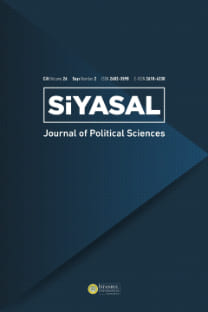Bir Siyasi İletişim Stili Olarak Popülizm: Akp’nin Popülist Siyasal Söyleminin Karşılaştırmalı Analizi
Bu çalışmanın ana amacı Türkiye’de siyasi söylemde var olan popülizmin derecesini ve türlerini sayısal veriler kullanarak
Anahtar Kelimeler:
Türkiye, Popülizm, Siyasi söylem, AKP, Siyasal islam
Populism As A Political Communication Style: A Comparative Analysis of AKP’s Political Discourse
This study, through quantitative analysis, aims to investigate the level and kind of populism in modern Turkish political
Keywords:
Turkey, Populism, Political discourse, AKP, Political islam,
___
Albertazzi, D. ve McD. (2008), Twenty-First Century Populism, Palgrave Macmillan, London.Canovan, M. (1981), Populism, London Junction, London.
Canovan, M. (1999), Trust the People! Populism and the Two Faces of Democracy. Political Studies, 47(1), 2-16.
Çınar, M. (2017), Turkey’s ‘Western’ or ‘Muslim’ Identity and the AKP’s Civilizational Discourse, Turkish Studies, 19(2), 176-197.
De La Torre, C. (2000), Populist Seduction in Latin America. Ohio University Press, Athens.
Gümüşçü, Ş. ve Sert, D. (2009), The power of the Devout Bourgeoisie: The Case of the Justice and Development Party in Turkey. Middle Eastern Studies, 45(6). 953-968.
Hawkins, K. A. (2009), Is Chávez Populist? Measuring Populist Discourse in Comparative Perspective. Comparative Political Studies. 42(8), 1040-1067.
Hawkins, K. A. (2010), Venezuela’s Chavisma and Populism in Comparative Perspective, Cambridge University Press, New York.
Jagers, J. ve Walgrave, S. (2007), Populism as Political Communication Style: an Empirical Study of Political Parties’ Discourse in Belgium. European Journal of Political Research, 46: 319-345.
Kessel, S. V. (2011), Explaining the Electoral Performance of Populist Parties: The Netherlands as a Case Study. Perspectives on European Polities and Society, 12(1), 68-88.
Knight, A. (1998), Populism and Neo-Populism in Latin America, Especially Mexico. Journal of Latin American Studies. 30(2), 223-248.
Laclau, E. (2005), On Populist Reason. Verso, London. Lloyd, J. (2003), The Closing of the European Gates? The New Parties of Europe. The Poltical Quartely Publishing. Oxford.
Özpek, B. B. ve Yaşar, N.T. (2017), “Populism and Foreign Policy in Turkey Under the AKP Rule”, Turkish Studies, 19(2), 198-216
Mudde, C. (2004), The Populist Zeitgeist. Government and Opposition. 39(4), 541-563.
Mudde, C. (2007), Populist Radical Right Parties in Europe. Cambridge University Press. Cambridge.
Pauwels, T. (2011), Measuring Populism: A Quantitative Text Analysis of Party Literature in Belguim. Journal of Elections. 21(1), 97-119.
Rooduijn, M. (2009a, May 28-29), The Concept of Populism in Comparative Research. A double Operationalization Strategy of Generalization and Particularization. Paper Presented at the politicologenetmaal, Nijmegen.
Rooduijn, M. (2009b, Sebtember 10-12), A Populist Zeitgesit? Populist Parties and Mainstream Parties in the Netherlands and the United Kingdom, Paper Presented at the ECPR General Conference, Postdam,
Selçuk, O. (2016), Strong Presidents and Weak Institutions: Populism in Turkey, Venezuela and Ecuador. Southeast European and Black Sea Studies. 16(4), 571-589.
Stanley, B. (2008), The Thin Ideology of Populism. Journal of Political Ideologies. 13(1), 95-110.
Taggart, P. (1995), New Populist Parties in Western Europe. West European Polities. 18(1), 34–51.
Toprak, B. (1997), Türkiye’de Dinin Denetim İşlevi. Ersin Kalaycıoğlu – Yaşar Sarıbay (Ed.). Türkiye’de Siyaset: Süreklilik ve Değişim, (pp. 387-397). Der yayınları, İstanbul.
Toprak, Z. (1992), Popülizm ve Türkiye’deki Boyutları. Cem Yayınları; Üniversite Öğretim Üyeleri Derneği. 1992, 41-65.
Toprak, Z. (2013), Türkiye‘de Popülizm (1908-1923). Doğan Kitap, İstanbul.
Yabancı, B. (2016), Populism as the Problem Child of Democracy: The AKP’s Enduring Appeal and the Use of Meso-Level Actors. Southeast European and Black Sea Studies. 16(4), 591-617.
- ISSN: 1303-1260
- Yayın Aralığı: Yılda 2 Sayı
- Yayıncı: İstanbul Üniversitesi
